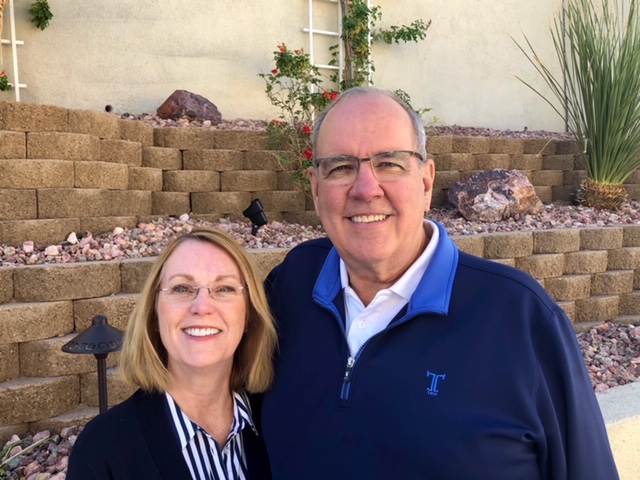Dave Kapaska, D.O.’86, and his wife, Mary Ann, have long supported Des Moines University. Dr. Kapaska serves as chair of the DMU Board of Trustees, and the couple has contributed financially to the University, including to its Purple & Proud Campaign. But their latest gift, to name the Telehealth Room on the new West Des Moines campus, is especially fitting: Located in the new Innovation Building, the room will be where students receive training to deliver telehealth services, an area where Dr. Kapaska has significant expertise.
“We were excited that space was available to name on the new campus,” he says.
In the early 2000s, when he was senior vice president/chief medical officer at Avera McKennan Hospital in Sioux Falls, SD, the Leapfrog Group, a nonprofit organization that monitors the quality and safety of American health care, issued a report recommending that hospitals staff their intensive care units with intensivists, physicians who are specially trained and certified in critical care. Research has shown that ICU patients who are cared for by intensivists experience reductions in hospital stays, health care-associated infections and ICU mortality.
At the time, Avera Health had 28 hospitals in South Dakota, Minnesota, Iowa, Nebraska and North Dakota, but only two had intensivists on staff.
“My CEO asked me, ‘Dave, what are we going to do about that?’” Dr. Kapaska recalls. He researched other health organizations, including one that had developed a system to staff several ICUs with one intensivist by using telehealth technology. In 2002, he began talking with his colleagues about implementing a telehealth system at Avera. In 2004, they launched its first “e-ICU.”
“We had great results, including a 50 percent reduction in mortality and a two-day reduction in ventilator use,” Dr. Kapaska says. “We proved that we could take care of our sickest patients with telehealth, so we asked ourselves, ‘Who else can we help?’”
Understanding the need for emergency care in the small towns and rural areas Avera served, he and his team launched e-Emergency. The federal government required every hospital prescription needed pharmacist approval, so they started e-Pharmacy. Avera eCare became a world model in telehealth services. Thanks to the generosity of the Helmsley Charitable Trust, Avera was able to expand its footprint to 600-plus sites across 32 states in a broad range of service lines, including behavioral health, school health and senior care.
While Dr. Kapaska is proud of Avera’s leadership in telehealth, it’s the lives it has saved that are most meaningful to him. He describes a case in which a child wandered outside, wearing only pajamas, during a blizzard and was found comatose. The child’s body temperature was 82 degrees.
“Because of the blizzard, we couldn’t fly or drive to the child, so we connected our intensive care pediatrician connected to the hospital there,” he says. “The pediatrician was able to slowly increase the child’s temperature and revive him. The child lost just the tips of three fingers.”
In addition to the Kapaskas’ support of the new Telehealth Room, in February DMU was awarded a $2 million CARES Act Recovery Assistance grant by the U.S. Department of Commerce’s Economic Development Administration. This funding will help support the acquisition of the latest telehealth technology and equipment. The COVID-19 pandemic has
underscored the value of this form of health care delivery. “It’s a core part of being a physician in the future,” Dr. Kapaska says.
Telehealth technology has advanced so that for the physician, “it’s like being in a patient’s room with your hands in your pockets,” he adds. Telehealth providers need the same medical skills as they do for in-person care, but they also must have a keen ability to communicate with the patient, other doctors and nurses in a virtual format. Those are the key skills students will gain in the new Telehealth Room.
“That ability to interact effectively and with empathy while using telehealth tools is a critical art form for our students,” he says.
Additional naming opportunities are still available at our new campus. View opportunities here or contact Stephanie Greiner at (515) 271-1386 or stephanie.greiner@dmu.edu.

